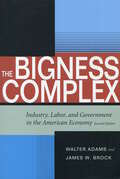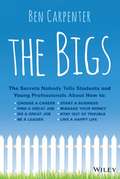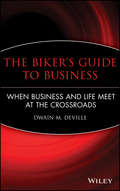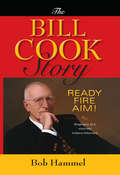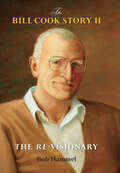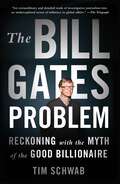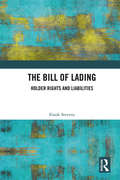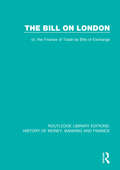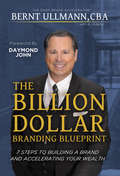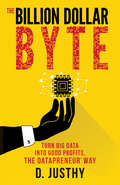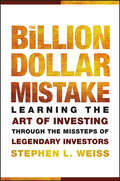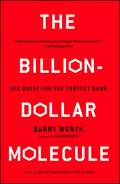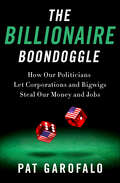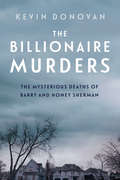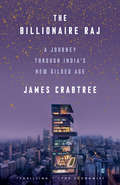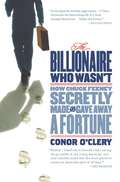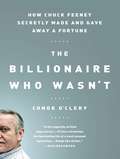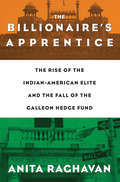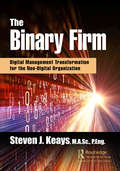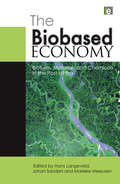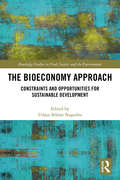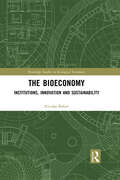- Table View
- List View
The Bigness Complex: Industry, Labor, and Government in the American Economy, Second Edition
by Walter Adams James W. BrockThe Bigness Complex confronts head-on the myth that organizational giantism leads to economic efficiency and well-being in the modern age. On the contrary, it demonstrates how bigness undermines our economic productivity and progress, endangers our democratic freedoms, and exacerbates our economic problems and challenges. This new edition has a thoroughly updated variety of issues, examples, and new developments, including government bailouts of the airline industry; regulation of biotechnology; the fiasco of recent electricity deregulation; and mergers and consolidations in oil, radio, and grocery retailing. The analysis is framed in the timeless context of American distrust of concentrations of power. The authors show how both the left and the right fail to address the central problem of power in formulating their diagnoses and recommendations. The book concludes with an alternative public philosophy as a viable guidepost for public policy toward business in a free-enterprise democracy.
The Bigs
by Ben CarpenterWhat is The Bigs? In baseball, "the bigs" is slang for the big leagues. When you become responsible for yourself, and you are being paid to do a job, you are in the big leagues. The real world is tough, competitive, and much is expected.This is a quintessentially American story of one man's journey through his career and life. Wall Street veteran Ben Carpenter chronicles the people he met, the experiences he had, the mistakes he made, and what he learned along the way. Readers will encounter a colorful cast of real-life characters which include Big Hank, Hoops, Sweater Girl, The Zombies, Mr. Nuts, The Cheese, Deep Throat, and The RAT. Their tales illuminate Carpenter's progress from newly minted liberal arts graduate, to the owner of an out-of-control bar in Manhattan, to the CEO of a major international investment company.While the real world can be very fun, it's also very much a battle, and that battle is not easy for anyone. The Bigs is an eye-opening book with specific, comprehensive, and practical advice you won't hear anywhere else. This is a book that parents will want to read and give to their children--and their children will want to read and share with their friends.
The Biker's Guide to Business: When Business and Life Meet at the Crossroads
by Dwain M. DeVilleThe path to business success is an open road and you'd better be ready for anything! What do businesspeople and entrepreneurs have in common with bikers? More than you'd suspect. The freedom of hitting the open road is a concrete extension of the need for freedom that encourages entrepreneurs to start businesses. The desire to succeed in business by doing it your own way is no different than the desire to hit the road and plot your own course on two wheels. The Biker's Guide to Business explores these parallels and offers hard-won business wisdom specially suited for Business Bikers who do it their way-whether out on the highways or in the corporate boardroom. Introduces DeVille's Navigation Process that helps you develop your own action plan for achieving your own unique vision of success Shows you how to tailor a road map to guide your personal journey from where you are now to where you want to be tomorrow Uses biker terminology, analogies, and parallels to communicate real business wisdom Though written to appeal to bikers, the book is a handy business guide for anyone willing to take the ride Whether or not you're a biker, the passion to ride is the same passion that pushes people to succeed professionally by taking their own path. Hop on, rev up, and succeed.
The Bill Cook Story
by Bob HammelBill Cook epitomizes the American success story. His business ventures in medical devices, pharmaceuticals, genetics, real estate, retail management, and travel services have made him a billionaire. Yet, Cook continues to lead a modest life, involving himself in a variety of philanthropic activities that have included historic preservation and even a marching band. This riveting story is the first-ever biography of the entrepreneur who, working from the spare bedroom of his Bloomington, Indiana, apartment in 1963 with a $1,500 investment, began to construct the wire guides, needles, and catheters that would become the foundation of the global multi-billion-dollar Cook Group. Biographer Bob Hammel, with extraordinary access to Cook, his files, and his associates, has created a vivid portrait of this modern, multidimensional Horatio Alger--quirky humor, widely varied interests, and all. Informative and inspiring, this book celebrates an exceptional self-made individual.
The Bill Cook Story II: The Re-Visionary
by Bob HammelA look into the final years of the billionaire entrepreneur and philanthropist and his work in historic preservation in Indiana.Working from the spare bedroom of his Bloomington, Indiana, apartment in 1963 with a $1,500 investment, Bill Cook began to construct the wire guides, needles, and catheters that would become the foundation of the global multi-billion-dollar Cook Group. This story has been eloquently told in Bob Hammel’s The Bill Cook Story: Ready, Fire, Aim. The sequel to this story explores Cook’s final years, when the restoration work he championed, epitomized by the spectacular West Baden Hotel, became a driving force in his life and a source of great satisfaction and pleasure. Hammel takes us behind the scenes on the important restorations of Beck’s Mill, a Methodist Church that is now Indiana Landmarks Center, and the remarkable commitment of Cook toward reviving his hometown, Canton, Illinois. At the heart of the book are the events of Bill Cook’s final days and his death in April, 2011, but this solemn chronicle soon gives way to fond recollections of Cook’s extraordinary life and legacy, and to the continuing saga of the company he founded as it looks toward a bright future.“In The Bill Cook Story II: The Re-Visionary, Bob Hammel engagingly highlights several of Cook’s major restoration efforts, and also chronicles how he remained dedicated to such work even as his health failed.” —Indiana Magazine of History
The Bill Gates Problem: Reckoning with the Myth of the Good Billionaire
by Tim SchwabNew York Times Editors' ChoiceA powerful investigation of Bill Gates and the Gates Foundation, showing how he uses philanthropy to exercise enormous political power without accountabilityThrough his vaunted philanthropy, Bill Gates transformed himself from a tech villain into one of the most admired people on the planet. Even as divorce proceedings and allegations of misconduct have recently tarnished his public image, the beneficence of the Gates Foundation, celebrated for spending billions to save lives around the globe, is taken as a given. But as Tim Schwab shows in this fearless investigation, Gates is still exactly who he was at Microsoft: a bully and monopolist, convinced of his own righteousness and intent on imposing his ideas, his solutions, and his leadership on everyone else. At the core, he is not a selfless philanthropist but a power broker, a clever engineer who has innovated a way to turn extreme wealth into immense political influence—and who has made us believe we should applaud his acquisition of power, not challenge it. Piercing the blinding halo that has for too long shielded the world’s most powerful (and most secretive) charitable organization from public scrutiny, The Bill Gates Problem shows how Gates’s billions have purchased a stunning level of control over public policy, private markets, scientific research, and the news media. Whether he is pushing new educational standards in America, health reforms in India, global vaccine policy during the pandemic, or Western industrialized agriculture throughout Africa, Gates’s heady social experimentation has shown itself to be not only undemocratic, but also ineffective. In many places, Bill Gates is hurting the very people he intends to help. No less than dark-money campaign contributions or big-business political lobbying, Bill Gates’s philanthropic empire needs to be seen as a problem of money in politics. It is a dangerous model of unconstrained power that threatens democracy and demands our attention.
The Bill of Lading: Holder Rights and Liabilities
by Frank StevensThe carriage of goods by sea starts off with a contract of carriage, an essentially simple and straightforward contract between two parties, the shipper and the carrier. Very often, however, a bill of lading is issued and a third party appears on the scene: the holder of the bill of lading. The holder was not involved in the making of the contract of carriage, but does have rights, and possibly obligations, against the carrier at destination. The question then is how the third-party holder of the bill acquires those rights and obligations. Analysing the different theories that have been proposed to explain the position of the third party holder, this book makes a distinction between contractual theories and non-contractual theories to explain the holder's position. Contractual theories build on the initial contract of carriage and apply contract law mechanisms while non-contractual theories construe the position of the third-party holder independently. Following the analysis and appraisal of the different theories, this book makes the case that the position of the third-party holder of the bill of lading is not obvious or self-evident; and submits that a statutory approach to the position of the holder of the bill of lading has advantages and would be preferable.
The Bill on London: or, the Finance of Trade by Bills of Exchange (Routledge Library Editions: History of Money, Banking and Finance #3)
by Methuen & Co LtdThe Bill is one of the oldest instruments of credit in the world, and this book, first published in 1952 and revised in 1976, provides an in-depth analysis of this financial instrument which has stood the test of centuries. No other book gives more than a part of the information here set out.
The Billion Dollar Branding Blueprint: 7 Steps to Building A Brand and Creating Wealth Through Brand Equity
by Bernt UllmannBuild strong brands using a step-by-step blueprint to achieve business acceleration and create lasting wealth.Your guide to building a strong brand using a step-by-step, easy to follow blueprint to achieve business acceleration and create lasting wealth.Author Bernt Ullmann, often referred to as "the man behind the brands," is a trusted brand acceleration expert, primarily in the fashion industry, for over 30 years. His debut book introduces and explains the systematic seven-step process he developed to help entrepreneurs, no matter who, launch a successful brand or scale their business.
The Billion Dollar Byte: Turn Big Data into Good Profits, the Datapreneur Way
by D. JusthyThe Billion Dollar Byte equips high-level businesspeople and technologists with the tools and strategies to leverage Big Data to drive ethical “Good Profit.” Traditional legacy companies need a framework for making data strategy central to their business models in the same way that the newer Digital Native companies have. The Billion Dollar Byte provides that framework by providing concrete models for creating smart data infrastructures, accurately weighing the value of data and data systems, investing in the right technologies, hiring entrepreneurial people with tech skills, leveraging the full value of data, and much more. It aims to help companies aligns their data strategy with their business model. There is a special importance placed on attracting and retaining the right entrepreneurial-minded technologists that can help leverage data for profit.
The Billion Dollar Mistake: Learning the Art of Investing Through the Missteps of Legendary Investors
by Stephen L Weiss&“Concentrating on personal finance don&’ts is a clever idea . . . an intriguing reminder of what not to do when investing your money.&” —The New York Times Brilliant investors and top businesspeople make mistakes, too—very expensive ones. Drawing on his twenty-plus years of experience at some of Wall Street&’s most prestigious firms, as well as original research and interviews with these legendary investors, Stephen Weiss offers fascinating narrative accounts of their billion-dollar blunders. Here, such prominent figures as Kirk Kerkorian, Bill Ackman, David Bonderman, Aubrey McClendon, and Leon Cooperman discuss the most significant trade or investment that went against them, the magnitude of the loss, its effect on their businesses—and on their personal lives. The book skillfully examines the causal relationship between the quirks of each investor&’s personality and the mistakes they have committed—as well as the lessons learned. While some investors made errors of judgment, others made errors of perception. But no matter how many zeros were attached to these particular losses, investors at any level can profit from the wisdom gained—and avoid the same missteps. &“When a great investor flubs it, everyone can learn a lesson. With that in mind, author Stephen Weiss delves into the biggest mistakes of such Wall Street luminaries as Bill Ackman, Leon Cooperman and Richard Pzena.&” —Barron&’s
The Billion-Dollar Molecule: The Quest for the Perfect Drug
by Barry WerthJoin journalist Barry Werth as he pulls back the curtain on Vertex, a start-up pharmaceutical company, and witness firsthand the intense drama being played out in the pioneering and hugely profitable field of drug research. Founded by Joshua Boger, a dynamic Harvard- and Merck-trained scientific whiz kid, Vertex is dedicated to designing -- atom by atom -- both a new life-saving immunosuppressant drug, and a drug to combat the virus that causes AIDS.You will be hooked from start to finish, as you go from the labs, where obsessive, fiercely competitive scientists struggle for a breakthrough, to Wall Street, where the wheeling and dealing takes on a life of its own, as Boger courts investors and finally decides to take Vertex public. Here is a fascinating no-holds-barred account of the business of science, which includes an updated epilogue about the most recent developments in the quest for a drug to cure AIDS.
The Billionaire Boondoggle: How Our Politicians Let Corporations and Bigwigs Steal Our Money and Jobs
by Pat Garofalo"An alarming, fact-driven jeremiad urging change and action." –KirkusThe first comprehensive look at how politicians let the entertainment industry bilk taxpayers, hijack public policy and hurt economic investment, starting and ending with Trump. From stadiums and movie productions to casinos and mega-malls to convention centers and hotels, cities and states have paid out billions of dollars in tax breaks, subsidies, and grants to the world's corporate titans. They hope to boost their economies, create new and better jobs, and lure well-known events such as the Super Bowl--not to mention give their officials the chance to meet celebrities. That Big Entertainment drives bigger economies is a myth, however. Overwhelming evidence shows catering public policy to its promises results in a raw deal for the taxpaying public.In The Billionaire Boondoggle, Garofalo takes readers on a tour of publicly-subsidized corporate America to explain how that myth came to be, how much money America's elected officials throw away, and why courting Big Entertainment just courts disaster. You’ll learn how Maryland gave millions of dollars to Netflix to make House of Cards, and Nevada spent hundreds of millions on a new home for the NFL’s Raiders. New Mexico paid big money to host The Avengers, while city after city fell prey to the debt trap that is the Olympics. You’ll see how big sporting goods stores like Bass Pro Shops and big casinos across the country all get in on the subsidy scam. And you’ll see how many cities got in bed with hotel titans, including Donald J. Trump himself.This book is the go-to guide for the many ways in which American taxpayers unknowingly subsidize the TV shows they watch, the sports teams they root for and the hotels they sleep in, all based on an economic theory that only adds up for CEOs and bigwigs.
The Billionaire Murders: The Mysterious Deaths of Barry and Honey Sherman
by Kevin DonovanA top journalist crosses the yellow tape to investigate a shocking high-society crime.Billionaires, philanthropists, socialites . . . victims. Barry and Honey Sherman appeared to lead charmed lives. But the world was shocked in late 2017 when their bodies were found in a bizarre tableau in their elegant Toronto home. First described as murder-suicide — belts looped around their necks, they were found seated beside their basement swimming pool — police later ruled it a staged, targeted double murder. Nothing about the case made sense to friends of the founder of one of the world’s largest generic pharmaceutical firms and his wife, a powerhouse in Canada’s charity world. Together, their wealth has been estimated at well over $4.7 billion. There was another side to the story. A strategic genius who built a large generic drug company — Apotex Inc. — Barry Sherman was a self-described workaholic, renowned risk-taker, and disruptor during his fifty-year career. Regarded as a generous friend by many, Sherman was also feared by others. He was criticized for stifling academic freedom and using the courts to win at all costs. Upset with building issues at his mansion, he sued and recouped millions from tradespeople. At the time of his death, Sherman had just won a decades-old legal case involving four cousins who wanted 20 percent of his fortune. Toronto Star investigative journalist Kevin Donovan chronicles the unsettling story from the beginning, interviewing family members, friends, and colleagues, and sheds new light on the Shermans’ lives and the disturbing double murder. Deeply researched and authoritative, The Billionaire Murders is a compulsively readable tale of a strange and perplexing crime.
The Billionaire Raj: A Journey Through India's New Gilded Age
by James CrabtreeA colorful and revealing portrait of the rise of India’s new billionaire class in a radically unequal society India is the world’s largest democracy, with more than one billion people and an economy expanding faster than China’s. But the rewards of this growth have been far from evenly shared, and the country’s top 1% now own nearly 60% of its wealth. In megacities like Mumbai, where half the population live in slums, the extraordinary riches of India’s new dynasties echo the Vanderbilts and Rockefellers of yesterday, funneling profits from huge conglomerates into lifestyles of conspicuous consumption. James Crabtree’s The Billionaire Raj takes readers on a personal journey to meet these reclusive billionaires, fugitive tycoons, and shadowy political power brokers. From the sky terrace of the world’s most expensive home to impoverished villages and mass political rallies, Crabtree dramatizes the battle between crony capitalists and economic reformers, revealing a tense struggle between equality and privilege playing out against a combustible backdrop of aspiration, class, and caste. The Billionaire Raj is a vivid account of a divided society on the cusp of transformation—and a struggle that will shape not just India’s future, but the world’s.
The Billionaire Who Wasn't
by Conor O'CleryChuck Feeney was born in Elizabeth, New Jersey, to a blue-collar Irish-American family during the Depression. After service in the Korean War, he made a fortune as founder of Duty Free Shoppers, the world's largest duty-free retail chain. By 1988, he was hailed by Forbes Magazine as the twenty-fourth richest American alive. But secretly Feeney had already transferred all his wealth to his foundation, Atlantic Philanthropies. Only in 1997 when he sold his duty free interests, was he "outed" as one of the greatest and most mysterious American philanthropists in modern times. After going "underground" again, he emerged in 2005 to cooperate on a biography promoting giving while living. Now in his mid-seventies, Feeney is determined his foundation should spend down the remaining $4 billion in his lifetime.
The Billionaire Who Wasn't
by Conor O'CleryChuck Feeney was born in Elizabeth, New Jersey, to a blue-collar Irish-American family during the Depression. After service in the Korean War, he made a fortune as founder of Duty Free Shoppers, the world's largest duty-free retail chain. By 1988, he was hailed by Forbes Magazine as the twenty-fourth richest American alive. But secretly Feeney had already transferred all his wealth to his foundation, Atlantic Philanthropies. Only in 1997 when he sold his duty free interests, was he "outed" as one of the greatest and most mysterious American philanthropists in modern times. After going "underground" again, he emerged in 2005 to cooperate on a biography promoting giving while living. Now in his mid-seventies, Feeney is determined his foundation should spend down the remaining $4 billion in his lifetime.
The Billionaire Who Wasn't: How Chuck Feeney Secretly Made and Gave Away a Fortune
by Conor O'CleryChuck Feeney was born in Elizabeth, New Jersey, to a blue-collar Irish-American family during the Depression. After service in the Korean War, he made a fortune as founder of Duty Free Shoppers, the world’s largest duty-free retail chain. By 1988, he was hailed by Forbes Magazine as the twenty-fourth richest American alive. But secretly Feeney had already transferred all his wealth to his foundation, Atlantic Philanthropies. Only in 1997 when he sold his duty free interests, was he “outed” as one of the greatest and most mysterious American philanthropists in modern times. After going “underground” again, he emerged in 2005 to cooperate on a biography promoting giving while living. Now in his mid-seventies, Feeney is determined his foundation should spend down the remaining $4 billion in his lifetime.
The Billionaire Who Wasn't: How Chuck Feeney Secretly Made and Gave Away a Fortune
by Conor O'CleryChuck Feeney was born in Elizabeth, New Jersey, to a blue-collar Irish-American family during the Depression. After service in the Korean War, he made a fortune as founder of Duty Free Shoppers, the world's largest duty-free retail chain. By 1988, he was hailed by Forbes Magazine as the twenty-fourth richest American alive. But secretly Feeney had already transferred all his wealth to his foundation, Atlantic Philanthropies. Only in 1997 when he sold his duty free interests, was he "outed" as one of the greatest and most mysterious American philanthropists in modern times. After going "underground" again, he emerged in 2005 to cooperate on a biography promoting giving while living. Now in his mid-seventies, Feeney is determined his foundation should spend down the remaining $4 billion in his lifetime.
The Billionaire's Apprentice: The Rise of The Indian-American Elite and The Fall of The Galleon Hedge Fund
by Anita RaghavanJust as WASPs, Irish-Catholics and Our Crowd Jews once made the ascent from immigrants to powerbrokers, it is now the Indian-American's turn. Citigroup, PepsiCo and Mastercard are just a handful of the Fortune 500 companies led by a group known as the "Twice Blessed." Yet little is known about how these Indian emigres (and children of emigres) rose through the ranks. Until now...The collapse of the Galleon Group--a hedge fund that managed more than $7 billion in assets--from criminal charges of insider trading was a sensational case that pitted prosecutor Preet Bharara, himself the son of Indian immigrants, against the best and brightest of the South Asian business community. At the center of the case was self-described King of Kings, Galleon's founder Raj Rajaratnam, a Sri-Lankan-born, Wharton-educated billionaire. But the most shocking allegation was that the éminence grise of Indian business, Rajat Gupta, was Rajaratnam's accomplice and mole. If not for Gupta's nose-to-the-grindstone rise to head up McKinsey & Co and a position on the Goldman Sachs board, men like Rajaratnam would have never made it to the top of America's moneyed elite.Author Anita Raghavan criss-crosses the globe from Wall Street boardrooms to Delhi's Indian Institute of Technology as she uncovers the secrets of this subculture--an incredible tale of triumph, temptation and tragedy.
The Binary Firm: Digital Management Transformation for the Non-Digital Organization
by Steven J. KeaysThe world beyond 2020 will be profoundly different from today. Radical transformative technologies are changing the relationship between mankind and machines in a way that even Wells, Orwell, or Jobs could not fathom. Nobody can tell for certain what will emerge from these tectonic shifts, save for the fact that the status quo is already obsolete. In effect, humanity has entered a new age in its evolution: the Symbiocene era. Societal issues notwithstanding, the existential concern for businesses and organizations everywhere is pressing: how to survive, or better yet, thrive in this brave new scary world? The Binary Firm explores the orchestrating strategies to get in front of the technological tsunami that is sweeping the globe. Tsunami is not too strong a word: witness the threat posed by artificial intelligence to the very nature of work. This book constructs a conceptual management framework engineered to anticipate changes and empower the organization to exploit them to its immediate advantage. The exposition goes beyond worn-out buzzwords like innovation, disruption, and collaboration. It dives into the underlying foundation of an organization impacting its financial destiny. This book will resonate with managers and entrepreneurs who may struggle to master the often-mystifying rigors of digital forces. As goes the new adage, every business is a software company. But how to tame this feral beast? Readers will find pragmatic answers herein. No organization can afford the status quo in this era of pervasive interconnections. This is the playbook to change your game and succeed at digitally transforming your organization without breaking the bank.
The Biobased Economy: Biofuels, Materials and Chemicals in the Post-oil Era
by Johan Sanders Marieke Meeusen Hans LangeveldThe impending threats of catastrophic climate change and peak oil are driving our society towards increased use of biomass for energy, chemical compounds and other materials - the beginnings of a biobased economy. As alternative development models for the biobased economy emerge, we need to determine potential applications, their perspectives and possible impacts as well as policies that can steer technological and market development in such a way that our objectives are met. Currently, it is still far from clear what will be the most sustainable routes to follow, which technologies should be included, and how their development will affect, and be affected by, research, public opinion and policy and market forces. This groundbreaking work, edited by a group of leading researchers originally from Wageningen Agricultural University in the Netherlands, sets out to unpick the complex systems in play. It provides an illuminating framework for how policy and market players could and should drive the development of a biobased economy that is effective, sustainable, fair and cost efficient. Starting with a state-of-the-art overview of major biobased technologies, including biorefinery and technologies for the production of biofuels, biogas, biomass feedstocks for chemistry and bioplastics, it discusses how different actor groups interact through policy and markets. Information from case studies is used to demonstrate how the potential of the biobased economy in different parts of the world, such as North America, Europe, and emerging economies like China and Brazil can be realised using research, debate, policy and commercial development. The result is an essential resource for all those working in or concerned with biobased industries, their policy or research.
The Bioeconomy Approach: Constraints and Opportunities for Sustainable Development (Routledge Studies in Food, Society and the Environment)
by Udaya Sekhar NagothuThis book examines the bioeconomy concept, analysing the opportunities it can generate, the constraints and the potential benefits for society. The main objective of bioeconomy is to promote economic development, by creating jobs and enhancing the sustainable utilization of bio-resources. A primary driver of bioeconomy strategy, therefore, is the need to respond to the growing population's food and economic requirements. While today research and literature related to bioeconomy are limited, this book presents a unique collection of perspectives on the complex dimensions of the bioeconomy debate. Drawing on the experiences from Europe, Asia and Africa, it presents an international overview. The chapters address a wide range of issues, including coastal-land interactions, ecosystem services, food production, rural development, agriculture, forest management and bioenergy. As a whole, the volume outlines what role bioeconomy can play in contributing to the United Nations Sustainable Development Goals (SDGs) without compromising on the ecological sustainability and equitable distribution of benefits. The book concludes by providing recommendations for developing bioeconomy in respective sectors (agriculture, forestry, fisheries, renewable energy) and directions for planning future bioeconomy programmes and strategies. The Bioeconomy Approach will be of great interest to students and scholars of ecological economics, development economics and environmental economics, as well as policy-makers and practitioners involved in sustainable development.
The Bioeconomy: Institutions, Innovation and Sustainability (Routledge Studies in Ecological Economics)
by Nicolas BefortThe bioeconomy is steadily becoming more important in regional, national and European public policies. As it encompasses the transformation of agricultural, marine and organic resources into food, feed, fuels, energy and materials, the bioeconomy should become a major new industry, outlining the possibility of a post-fossil future. This book is the first attempt to depict the origins, formation and challenges of this new industry in terms of emerging institutions, innovation, and economic strategies. The result of this work is that the substitution of raw materials alone is not enough to get out of the fossil economy. This book develops a political economy of the ecological transition which theorizes the transition as a new crisis of capitalism. This phase is characterized by stakeholders’ attempts to develop renewed rationales and strategies to take control of the reorganization of flows of natural resources, their outcomes and their evaluation. The proposed framework considers recent results in four complementary research strands: transition studies, institutional economics, ecological economics, and the evolutionary economics of innovation. The book will be of interest to researchers interested in the development of the bioeconomy, and both researchers and students seeking to understand the role of heterodox economics in the ecological transition.
The Biological Bases of Economic Behaviour: A Concise Introduction
by David McFarlandHuman genetics has changed little over the past 20,000 years, but human economic behaviour has changed a lot. These changes are probably due to human cultural evolution. But studies of human hunter-gatherers, and of a variety of other animal species, show that their micro-economic behaviour is much the same. Whereas the standard economic analysis focuses on money, the biological approach brings time and energy into the analysis. Moreover, humans and other animals tested under laboratory conditions do not exhibit the complexity of the results of field studies. In other words, results obtained in the real world are not the same as those obtained in the laboratory. <P><P> The Biological Bases of Economic Behaviour invites readers to approach micro-economics from a biological viewpoint, in a clear and introductory manner.
